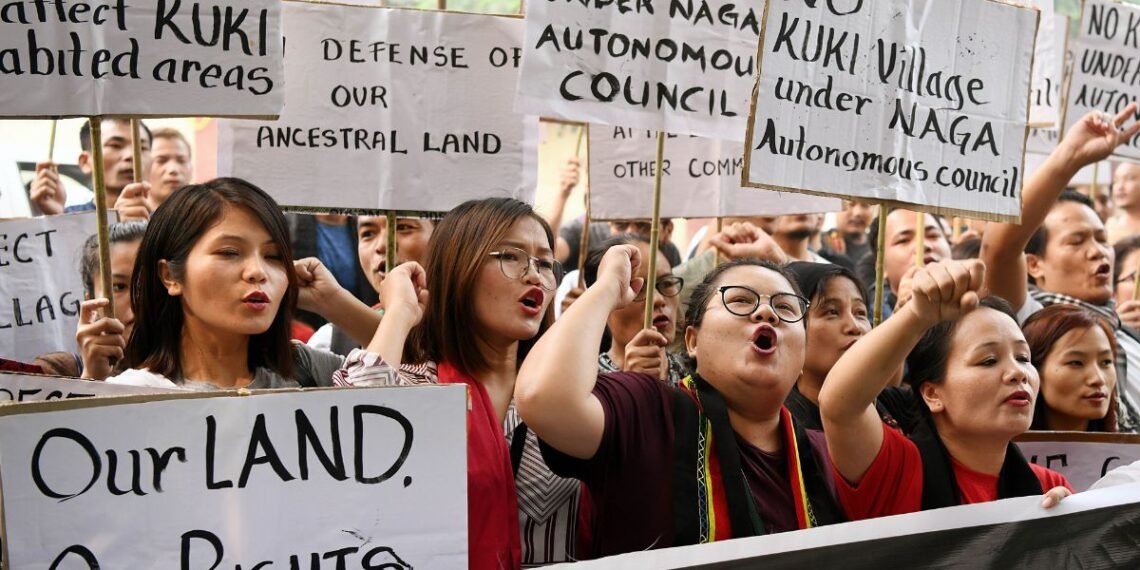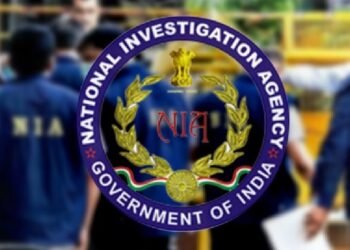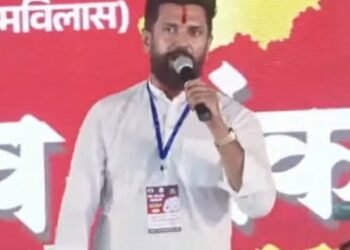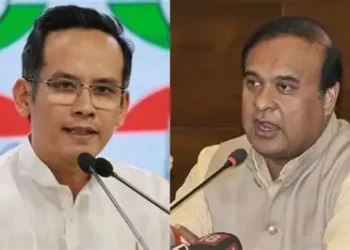With thousands displaced and lives lost, Kuki-Zo leaders question why armed Meitei groups get a seat at the table while their own communities face continued persecution. The fight for fairness in Manipur intensifies.
BY PC bureau
The Kuki Inpi Manipur, the apex body representing the Kuki tribes, led various Kuki organizations in condemning Governor Ajay Bhalla for entertaining the Imphal-based private militia Arambai Tenggol at the Raj Bhavan.
In a press release from its administrative center in Lamka, the Kuki Inpi condemned the meeting between Governor Ajay Bhalla and the leaders of Arambai Tenggol. The press release, marked with the reference number 04/KIM/PR/21-89, was a blistering critique of what the Kuki Inpi described as a “blatant engagement with individuals and groups responsible for orchestrating violence against the Kuki-Zo tribal community.” Signed from their official email (manipurkuki.inpi@gmail.com), the statement posed five pointed questions to the Governor and the Government of India, demanding immediate clarification and action.
ALSO READ: Kuki Inpi Keeps the Heat on Governor for Meeting Arambai Tenggol
The Kuki Inpi’s outrage centered on the Governor’s decision to meet with Tyson Ngangbam, also known as Korounganba Khuman, a figure they allege is a key commander in attacks on Kuki-Zo areas and currently under investigation by the National Investigation Agency (NIA). They questioned why such an individual was “entertained” while Kuki-Zo bunkers—defensive structures in their hill districts—were being demolished. This, they argued, signaled complicity rather than accountability, sending a dangerous message that perpetrators of terror might receive patronage instead of prosecution.
The press release didn’t stop there. It highlighted the mass looting of over 5,000 weapons and vast quantities of ammunition in 2023, questioning why no serious investigation had followed, while the NIA swiftly probed the 2024 Koutruk incident involving Kuki-Zo individuals. The selective application of justice, they claimed, undermined the rule of law and suggested an intent to shield those responsible for arming militias like Arambai Tenggol.
ALSO READ: Arambai Tenggol Claims Governor Assured No Separate Kuki-Zo Administration
Further, they demanded answers about the Central Bureau of Investigation’s (CBI) failure to arrest anyone in high-profile cases of violence against Kuki-Zo people, such as the naked parade of Kuki women and the beheading of David Thiek by Romesh Mangang, a Meitei militant allegedly linked to a local MLA. In contrast, they noted, cases in the Meitei-dominated valley seemed to receive prompt attention.
The Kuki Inpi also called out the Manipur Police for what they described as hollow boasts of arresting Meitei militants without evidence of prosecution, questioning whether these were genuine efforts or mere publicity stunts to justify targeting Kuki-Zo individuals. Finally, they pointed to Licypriya Kangujam, a Meitei activist, accusing her of procuring drones used by Meitei militias against Kuki-Zo communities, and contrasted her apparent impunity with the arrest of a Kuki youth on similar charges by the NIA. This “glaring double standard,” they argued, exposed systemic bias and the government’s unwillingness to hold Meitei perpetrators accountable.
The press release concluded with a resounding call to action:
“The Governor’s actions have further eroded the credibility of the administration in maintaining impartiality and upholding justice in Manipur. We demand that the Government of India take immediate action to investigate and prosecute those responsible for crimes against the Kuki-Zo people. The selective targeting of one community while protecting others is a gross miscarriage of justice that cannot be tolerated.”
Ripple of Condemnation Across Kuki Groups
The Kuki Inpi’s statement ignited a firestorm of reactions from various Kuki organizations, each amplifying the outrage and adding their voices to the chorus of condemnation.
The Kuki Organisation for Human Rights (KOHUR), known for its advocacy on behalf of the Kuki-Zo community, issued a strongly worded statement on February 26, 2025, slamming Governor Bhalla for meeting Arambai Tenggol leaders Korounganba Khuman and Robin Mangang.
KOHUR branded the outfit an “armed extremist group responsible for mass violence, ethnic persecution, and destabilization in Manipur,” accusing the Governor of legitimizing those responsible for the Kuki-Zo community’s suffering.
“The Kuki-Zo people will not remain silent while their persecutors are treated as political stakeholders,” they declared, signaling their intent to resist any perceived betrayal.
The Kuki Alliance for Nampi Awakening Movement echoed this sentiment on X at 06:55 PST on February 27, 2025, calling the meeting a direct threat to national security and the rule of law.
Labeling Arambai Tenggol a “terror-linked group under NIA investigation,” they tagged major media outlets like Deccan Herald and India Today NE, as well as the Home Ministry, urging broader attention to the issue. Their post included a graphic underscoring the violence attributed to the Meitei outfit, amplifying the Kuki Inpi’s demand for accountability.
The Broader Context of Ethnic Strife
The uproar over the Governor’s meeting with Arambai Tenggol cannot be understood without the backdrop of Manipur’s ongoing ethnic conflict, which erupted on May 3, 2023, between the valley-based Meitei majority and the hill-dwelling Kuki-Zo tribal community.
The violence, sparked by a dispute over affirmative action for the Meiteis, has claimed over 221 lives, displaced 60,000 people, and left countless homes and religious sites in ashes, according to government figures as of May 2024.
Unofficial tallies suggest even higher tolls.
Arambai Tenggol, a radical Meitei outfit, has emerged as a central player in this conflict. Initially claiming to be a cultural organization, it rose to prominence after the looting of over 5,000 weapons from state armories in 2023, arming itself and other Meitei groups.
Despite announcing its dissolution in May 2023, its members have been spotted in subsequent clashes, often in police commando uniforms, fueling allegations of state complicity.
The Governor’s meeting on February 25, 2025, came amid efforts to de-escalate tensions, with Arambai Tenggol’s PRO, Robin Mangang, claiming Bhalla urged them to surrender arms under certain conditions.
For the Kuki-Zo, however, this engagement was a betrayal, especially given their long-standing demand for a separate administration—a call first raised by Kuki MLAs in May 2023 and reiterated by groups like the Kuki Inpi ever since.
A Community United in Anger
As the dust settled on February 27, 2025, the Kuki-Zo community stood united in its condemnation.
From the Kuki Inpi’s formal press release to the visceral reactions of KOHUR, the Kuki Alliance, and grassroots voices on X, the message was clear:
The Governor’s meeting with Arambai Tenggol was not just a misstep—it was a wound reopened, a trust shattered.
For a people who have endured over 21 months of violence, displacement, and perceived injustice, this moment crystallized their resolve to fight for accountability, impartiality, and, ultimately, survival in a state torn apart by ethnic strife.
The ball now lies with the Government of India, as the Kuki-Zo wait to see whether their cries will be heard—or drowned out once more.












